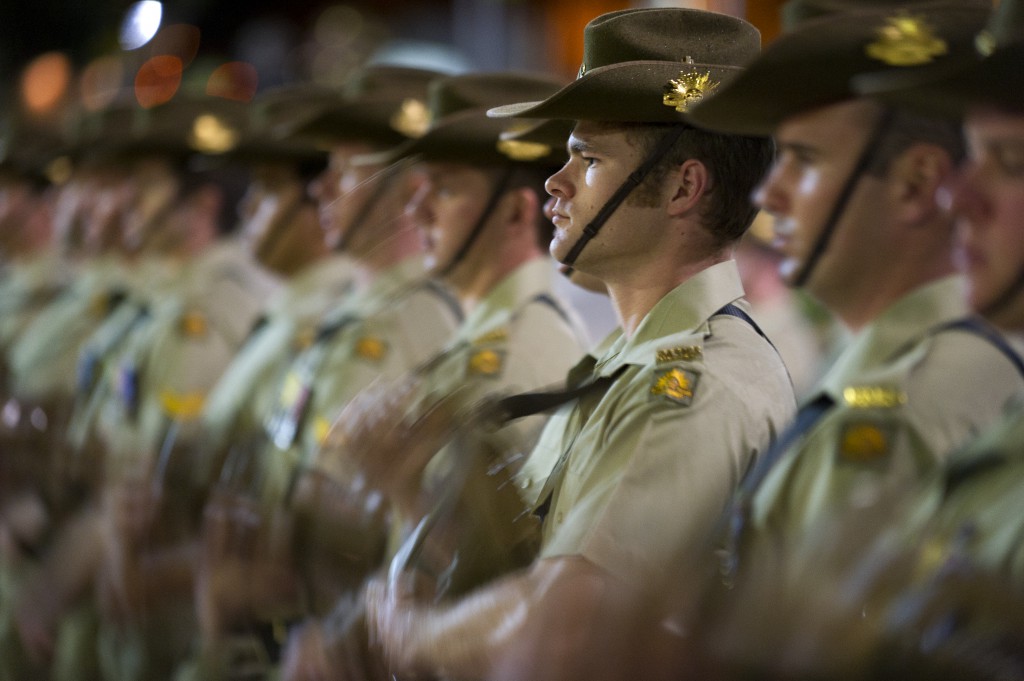The Canberra officer (8): politicisation
Posted By Graeme Dobell on September 15, 2014 @ 06:00
 [1]The avowed purpose of the Canberra officer project is to get an officer corps that can better serve Australia’s political leaders and win the bureaucratic battles. An undeclared purpose is the creation of political nous. This is the taboo of politicisation, discussed [2] in the previous column of this series through the experience of one Chief of the Defence Force.
[1]The avowed purpose of the Canberra officer project is to get an officer corps that can better serve Australia’s political leaders and win the bureaucratic battles. An undeclared purpose is the creation of political nous. This is the taboo of politicisation, discussed [2] in the previous column of this series through the experience of one Chief of the Defence Force.
Creating the Canberra officer is a good and proper project, but a clear effect is that senior officers dance closer to the political flames. To be positive, call this need for nous merely proper attention to the nature and needs of government; the negative rendering sees a politicisation that blurs the clear demarcations of roles and responsibilities between military and ministers. The dynamic reaches to both dimensions.
A former service chief, commenting on the officer project, told me the military knew it had to get smarter at handling how Canberra really operates: ‘Officers who go through the system in Canberra have to get used to ambiguity. If you don’t understand ambiguity you fail in this town. The military people who fail in Canberra are those who expect the politicians and bureaucrats to listen to them in an unquestioning way. You need to know how power works.’
The ambiguity rule in the power game says the best argument and the strongest logic don’t always go together, nor do they always win even if they stand united. A fine secretary of Defence used to admonish his staffers, only half in jest: ‘You’re being logical again, stupid, I’ve warned you about that.’
To serve Canberra’s power needs, senior officers and Defence officials have got closer to their political masters and the demands of the ministerial office. That means adopting elements of the political trade, especially the media obsession [3]. The federal government employs 1900 spin doctors, communications and marketing specialists [4]. The Tax Office is the biggest employer with 265 such staff, while Defence comes second with 216 media specialists. That really is doing it the Canberra way—staying on message is as important as proper saluting.
The aim of the project is to change the type of senior officers the system produces. Peter Jennings points to key personality characteristics by reflecting on the six Chiefs of the Defence Force he has dealt with, describing [5] them as ‘understated leaders, who put a premium on calmness and seldom raise their voices in anger’. No purple-faced screamers need apply. Peter writes that the evolving ADF leadership style has done away with fearsome generals as part of the redesign of organisational culture, responding to operational experience and Canberra’s needs:
‘In the Canberra policy world, success usually goes to those able to build consensus, supporting specific outcomes. Qualities that help include a capacity to negotiate, patience, listening skills and a certain amount of empathy, if only to help understand and counter the views of potential opponents. Read or, better still, watch any Estimates Committee hearings and you’ll see that most of the senior leadership of the ADF have those qualities in spades.’
In developing officers with political nous, Australia is tracking trends in the two militaries our services watch most closely and embrace most dearly—the US and British. In both, the taboo of politicisation has got more of an airing. After US Army General Stanley McChrystal was ejected for badmouthing his president, Yale Professor Bruce Ackerman argued [6] that this showed changes in the way US officers think about civilian leaders:
‘Studies over the last dozen years suggest that “a majority of active-duty officers believe that senior officers should ‘insist’ on making civilian officers accept their viewpoints”; and 65% of senior officers think it is OK to go public and advocate military policies they believe “are in the best interests of the United States.” In contrast, only 29% believe that high-ranking civilians, rather than their military counterparts, “should have the final say on what type of military force to use”.’
In his three years as Britain’s ambassador in Afghanistan, Sherard Cowper-Coles, saw [7] a deep imbalance in the relationship between the British military and its government:
‘A trend has set in where an overconfident and under-managed military machine fills a vacuum left by politicians, civil servants and diplomats unable or unwilling to provide firm strategic direction. The military is not just doing the fighting, but increasingly it is allowed to decide the overall direction of the campaign.’
When British military chiefs questioned [8] whether they had resources for new military operations, Prime Minister Cameron shot back: ‘You do the fighting, I’ll do the talking.’
Canberra has been spared such public dramas. Here, when governments get testy, they fire Defence secretaries, not generals. And the slouch hat mystique means our leaders are careful to be kind to the khaki.
Graeme Dobell [9] is the ASPI journalism fellow. Image courtesy of Department of Defence [10].
Article printed from The Strategist: https://www.aspistrategist.org.au
URL to article: https://www.aspistrategist.org.au/the-canberra-officer-8-politicisation/
URLs in this post:
[1] Image: http://www.aspistrategist.org.au/wp-content/uploads/2014/09/20140815adf8558864_313.jpg
[2] discussed: http://www.aspistrategist.org.au/the-canberra-officer-7-political-nous-and-playing-politics/
[3] media obsession: http://www.aspistrategist.org.au/military-beware-here-be-media-monsters/
[4] 1900 spin doctors, communications and marketing specialists: http://www.smh.com.au/national/public-service/army-of-1900-spin-doctors-costs-taxpayers-millions-20140325-35gqv.html
[5] describing: http://www.aspistrategist.org.au/the-adfs-quiet-leaders/
[6] argued: http://articles.latimes.com/2010/jun/22/opinion/la-oe-ackerman-mcchrystal-20100623
[7] saw: http://www.spectator.co.uk/features/7010593/breaking-rank/
[8] questioned: http://www.ft.com/cms/s/0/f8faa8a2-a0f2-11e0-adae-00144feabdc0.html#ixzz1QdiuhfXV
[9] Graeme Dobell: https://www.aspi.org.au/about-aspi/aspi-staff/fellows/graeme-dobell
[10] Department of Defence: http://images.defence.gov.au/20140815adf8558864_313.jpg
Click here to print.